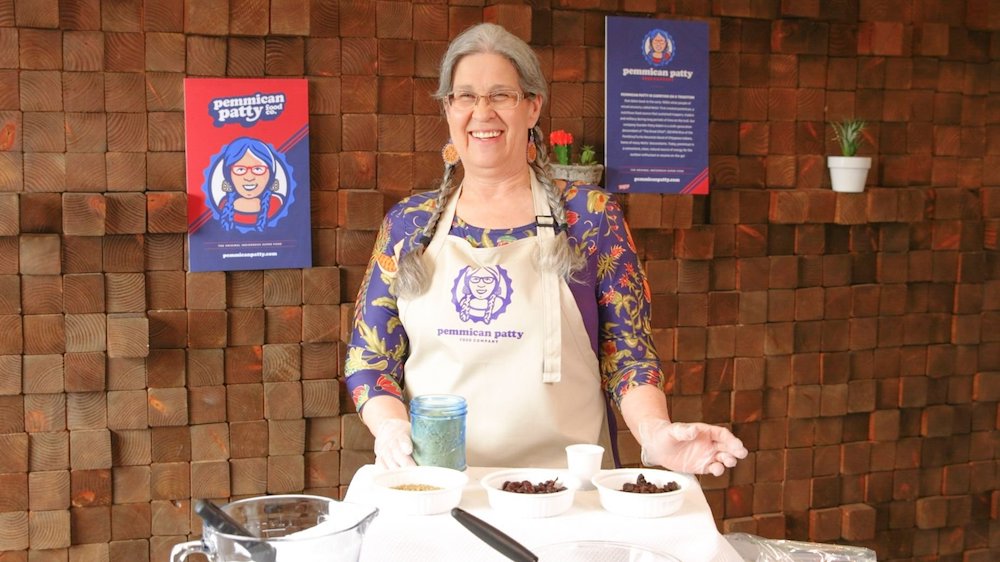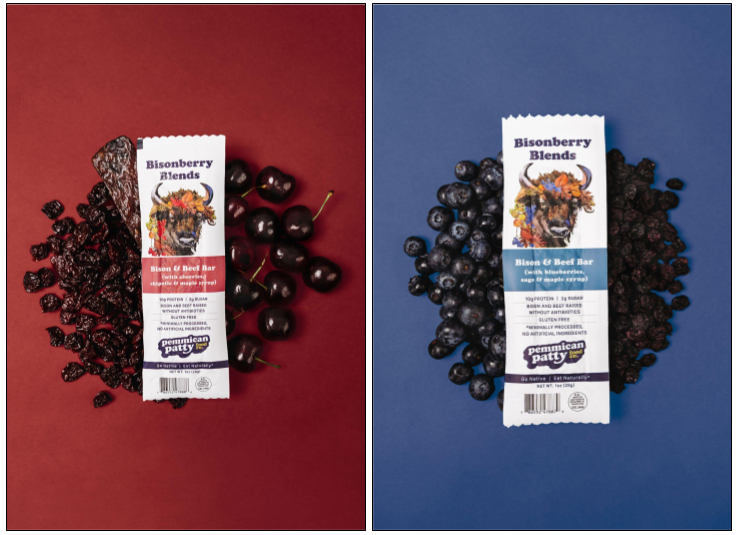
- Details
- By Chez Oxendine
- Indigenous Entrepreneurs
At an age when many people consider pursuits like writing their memoir or delving into genealogy, Patricia Mabin took a different path at 61.
Mabin, a member of the Pembina Band of Chippewa Indians, launched a family business built around her culture and an Indigenous superfood with a history spanning over 5,000 years.
The food, pemmican, is a blend of dried meat with fat and berries to create a long-lasting, easily stored meat snack. Traditionally used by hunters and scouts on long expeditions, pemmican has become the focal point of Pemmican Patty, the Bismarck, N.D.-based food company she co-founded with her brother, Mike, and her nephew, Micah Mabin.
The company’s journey began in 2019 when Patricia, who is now 65, started developing their bison pemmican product. It wasn’t until 2021 that the company’s growth fully kicked off as the co-founders dedicated more than a year to refine the recipe, fine-tune the product and figure out the optimal ingredients, then begin shipping it. Micah, who has a degree in chemistry from the University of North Dakota, was instrumental in the product development process, while Mike, who runs an advertising agency, worked on sales and marketing. Patricia, whose long braids and beaded earrings inspired the company’s charming logo, describes her role as that of “visionary and keeper of the culture.”
The result of those two-years of work is the Bisonberry Blend bar, a protein-rich food blend of bison and 100% grass-fed beef — each antibiotic-free and hormone-free — along with berries, seal salt, maple sap-water and other natural ingredients. They’ve also launched a line of beef jerky strips.
The steady road to launching the traditional food product seems to have been worth the wait. Today, the company has cleared multiple production runs and earned the attention of several distributors, food-security groups and food-sovereignty organizations, including the North American Traditional Indigenous Food Systems (NATIFS) nonprofit started by famed Sioux Chef Sean Sherman in Minneapolis.
The growth, however, has presented the Mabins with a question: how to scale up production?
“Our goal was to get culturally relevant products in the hands of our brothers and sisters where they could benefit from it, and we’ve managed to do that,” Patricia told Tribal Business News. “But now that our products are becoming very popular, we're faced with the question of how do we move forward in a good way?”
The challenge comes from trying to find Native partners aligned with the company’s mission, Patricia Mabin said. A supportive non-Native manufacturer in Wisconsin has helped produce the original runs of the bison berry bars, but that still begs the question of where to source bison, and whether or not Native manufacturing partners — whose participation could be a way for Pemmican Patty to “give back” to communities in search of economic development opportunities — could be used alongside or instead of their present partner.
“Manufacturing in Indian Country is just not really available, and especially in the meat industry,” Patricia said. “There are places that are able to butcher and process the meat, but then taking the next step to create a shelf-stable product, that's not there yet. We were told it can't be done, it can't be done, but it's being done right now.”
It’s a crucial question to answer, because things don’t appear to be slowing down for Pemmican Patty or the larger superfood market the company has entered. Future Market Insights places the 2022 superfood market at $166 billion, with a projected compound annual growth rate of 6% between 2022 and 2032.
The market insights report attributes the market growth to growing concerns about health amid “rising cases of cardiovascular diseases, diabetes, osteoporosis, obesity, and cancer” — all of which are well-documented concerns throughout Native communities.
Addressing those concerns was a highly important goal behind starting Pemmican Patty, according to the company’s namesake founder.
“The idea was really a desire to carry on our culture and to share that story of just really clean, natural food products that can be healthy for people in all ways, and can combat some of the diabetes, heart disease, all those things,” Patricia said. “That was important to us when we were developing the recipe.”
 Most sales of Pemmican Patty come from about 30 distributors, including tribes, food banks and wholesalers. (Photo: Courtesy)
Most sales of Pemmican Patty come from about 30 distributors, including tribes, food banks and wholesalers. (Photo: Courtesy)
The “lion’s share” of Pemmican Patty’s sales stem from about 30 distributors, including tribes, food banks, and wholesalers picking up the bars for sale in their visitor centers and retail outlets, Michael Mabin told Tribal Business News.
As the Indigenous Food Lab Market, a division of NATIFS, prepared to open in June this year, General Manager Jason Garcia knew he wanted a pemmican or jerky product on the shelves, he told Tribal Business News. He ended up ordering both from Pemmican Patty and both have been best-sellers since they arrived, he said. In addition to its designation as a superfood, the bison bars are high in protein at a time when protein snacks have proven a popular option for customers.
“I wanted to make sure that we were showing that respect to bison products, and I needed something I could put on the shelf to show that,” Garcia said. “It's really easy to get excited about finding a really great product, or if you just meet a really great person, and with Pat it's really been both.”
The reception from other distributors and growing word-of-mouth about the unique pemmican products has been strong, Michael said.
“Really, (customers) have come to us unsolicited, and said ‘We’ve heard about your product and we’d like to make it available to our customers,’” Michael said. “Our distributor network is really growing very quickly, and that's where we're finding this multiplier effect. Different groups are buying hundreds or thousands of units … Our footprint has really grown.”
The growth has been so rapid that the Mabin family has faced challenges in meeting the demand, Michael said. While their manufacturing partner has stepped up its production, Patricia still packages and ships the final product. The family doesn’t see that work load as sustainable given the growing popularity of their business. Therefore, it comes back to that question of how to scale up, Michael said.
“We really feel like, based on the growth we’re seeing, we’d like to open our minds to other potential partners, in particular tribes that might be looking to expand their economic development efforts into food, or even if they have sourced items that we could use in the bars,” Michael said. “We really need to look at how to scale all this up.”
It’s a challenge the Mabins want to rise toward, Michael said, because they believe wholeheartedly in the product: healthy, clean food with traditional origins.
“It really started with that,” he said. “It was going to be small, we would just kind of put it out there at the different tribal events, and it's taken kind of a life of its own right now. We want to let it come to life as it's supposed to, and that's why we're feeling like we need to open our arms to others.”
